Posts Tagged ‘“Boston bike accident lawyers”’
Breakstone, White & Gluck Supports Bike Safety Events in East Boston and East Arlington
Boston has some hard-working community bike programs which help children and their families learn the rules of safety. We recently supported two of these community groups, Boston Bikes and East Arlington Livable Streets Coalition.
Boston Bikes Bike Giveaway in East Boston. On June 12, the Boston Bikes’ Roll It Forward program gave away 40 bikes to children at the Orient Heights Boston Housing Authority Development. Children ages 5-7 were invited to sign up to receive a bike. Boston Bikes collects and repairs used bikes to distribute through its Roll It Forward program, which serves Boston residents who do not have access to a bike.
Children who participated received a new bike along with a new bike helmet. Attorney Sam Segal of Breakstone, White & Gluck helped fit the children for new helmets and spoke to them about the importance of wearing one while riding. Then, the Boston Bikes staff and volunteers taught the children safe riding techniques. Afterward, each child received a certificate showing they had completed safety training.
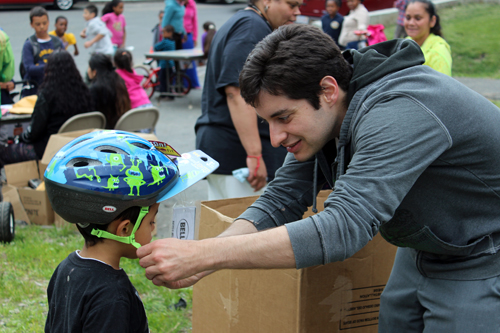 Attorney Sam Segal of Breakstone, White & Gluck helps fit bike helmets at a Boston Bikes event at Orient Heights Boston Housing Authority development.
Attorney Sam Segal of Breakstone, White & Gluck helps fit bike helmets at a Boston Bikes event at Orient Heights Boston Housing Authority development.
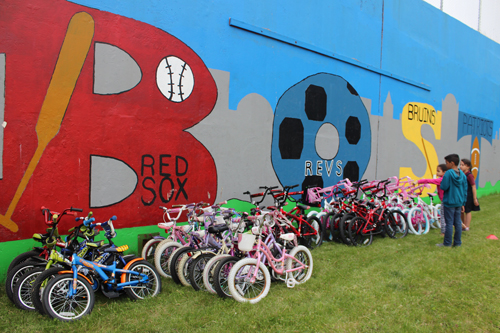 Boston Bikes event at Orient Heights Boston Housing Authority development.
Boston Bikes event at Orient Heights Boston Housing Authority development.
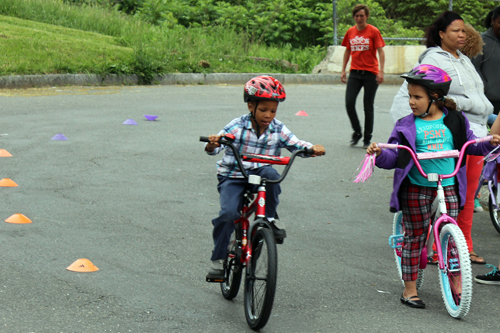 Boston Bikes event at Orient Heights Boston Housing Authority development.
Boston Bikes event at Orient Heights Boston Housing Authority development.
Thompson School in East Arlington. On June 4, the East Arlington Livable Streets Coalition organized a bike safety training for 98 fourth- and-fifth graders at Thompson elementary school. A representative from MassBike spoke to the children about safe riding techniques, proper helmet fitting and bike maintenance. Phil Goff of the East Arlington Livable Streets Coalition also spoke to the children about wearing bike helmets and safety. Breakstone, White & Gluck donated bike helmets to children who showed up without one or needed one that properly fit.
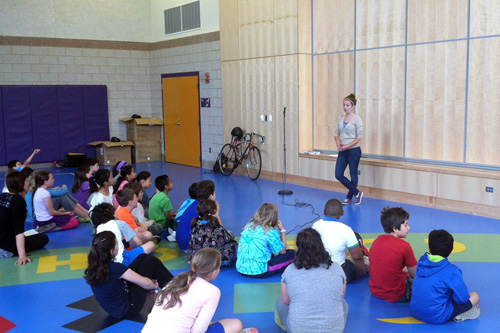 East Arlington Livable Streets Coalition event at Thompson School in East Arlington.
East Arlington Livable Streets Coalition event at Thompson School in East Arlington.
Learn more about Boston Bikes’ Roll It Forward and East Arlington Livable Streets Coalition.
Read More
Boston’s Hubway Bike Share Expanding into Cambridge
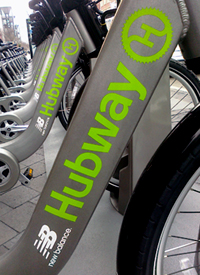 Boston’s Hubway bike share program is about to push beyond city limits, with an expansion over the Charles River into Cambridge and other communities starting as early as this week.
Boston’s Hubway bike share program is about to push beyond city limits, with an expansion over the Charles River into Cambridge and other communities starting as early as this week.
The Boston Globe reports the first of 24 new bike kiosks may start arriving in Cambridge this week and should operational by the second week in August. Somerville is slated to receive 12 stations with four planned in Brookline. The city of Boston launched the program in the summer of 2011. It now has 600 bikes for 61 stations and will add 11 new stations. With the expansion, the Boston region will have more than 1,000 public bikes available, The Boston Herald reported.
In Cambridge and Somerville, bike stations will be added at major squares and areas in between. In Brookline, new stations are coming to Coolidge Corner, Town Hall and the Brookline Village MBTA stop.
In Boston, new stations will be placed in Allston, Charlestown, Dorchester and Roxbury. Next year, Hubway may expand into Jamaica Plain, as well as Newton and Arlington, officials told The Boston Herald.
The expansion comes after a first year in which Hubway exceeded all expectations. It has seen twice as many trips and paid subscribers as planned. Over 360,000 individual bike trips have been taken since its start and this summer, tourists and commuters are taking about 2,000 bike trips per day.
The program is operated by Alta Bicycle Share in partnership with Boston Bikes, an initiative of the City of Boston. It is partially funded by the Federal Transit Administration. Outside Boston, each community and Alta Bicycle Share work together on securing grants and sponsorships to fund each bike station, which can cost $50,000.
The program offers Annual Membership for three seasons, which can be purchased online for $85. These members receive a key to unlock bikes for use. Rides under 30 minutes are covered under the membership fee; longer rides incur additional fees. Others can purchase short-term Access Passes for 24 hours or three days.
The Hubway reported few bike accidents resulting in injury during its first year. The program reported no bike accidents requiring ambulance response and only two bike accidents overall. The program’s contract requires riders to wear helmets to protect themselves in bike accidents. It encourages this by making helmets available for purchase when you buy a membership. It also has a network of retailers throughout the city who offer discounted memberships.
Related:
- Hubway, turning 1, is about to expand, The Boston Globe.
- Hubway expansion to bring another 400 bikes to roads, The Boston Herald.
- The Hubway.
- What to know about cycling in Boston, Breakstone, White & Gluck.
Hubway Bike Share Program Returns to Boston
 The New Balance Hubway bike sharing program re-launches in Boston tomorrow. Sixty percent of the stations will open, with the remainder scheduled to offer bike rentals by April 1.
The New Balance Hubway bike sharing program re-launches in Boston tomorrow. Sixty percent of the stations will open, with the remainder scheduled to offer bike rentals by April 1.
Hubway opened last July and had a busy first season with 3,650 cyclists signed up as annual members. The system, which is partially funded by the Federal Transit Administration, is operated by Alta Bike Share in partnership with Boston Bikes, an initiative of the City of Boston.
Cyclists can join as annual members for $85 per year or use the system as casual members and pay $12 for 3 days or $5 for 24 hours. The first 30 minutes of each ride is included in the cost, with riders paying for additional time based on their membership plan.
The schedule for opening bike rental stations could be delayed depending on weather conditions. Hubway recommends cyclists visit the Station Map page of its website to monitor progress, follow the program on Facebook or Twitter or download its free Spotcycle application to their smart phone.
The Boston bike accident lawyers at Breakstone, White & Gluck offer these safety tips for cyclists and drivers to avoid cycling accidents:
For Cyclists:
Wear a helmet. Protect yourself from sustaining injuries in bicycle accidents. Your purchase agreement with the Hubway program also requires it. Riders can purchase helmets when they register for the program. Helmets may also be available at some stations and the program has arranged for a number of local retailers to offer helmets at a discounted price of $7.99.
Cyclists should generally ride to the right of traffic, on the right side of the road. Bicyclists may also operate in bike lanes where available and in the center of the lane. Up to two bicyclists may travel abreast in the same lane. Cyclists are not permitted to ride on sidewalks in business districts and many areas of Boston.
Cyclists should never ride against traffic. They have to stop at red lights and stop signs just like motor vehicle traffic.
For Drivers:
Watch your speed! Drivers should travel at the speed limit or slower when conditions involving other vehicles, cyclists or pedestrians warrant it. Unless posted otherwise, state law requires drivers to travel at 30 mph in thickly settled or business districts and 40 mph outside of these areas.
Drivers should take caution turning to avoid bike accidents. Drivers who are turning left must yield the right of way to cyclists.
Drivers should look before they exit a parked car so as not to injure or impede the travel of a passing cyclist. This is illegal, can cause bicycle accidents and carries a fine of up to $100.
Drivers must have adequate room to pass a cyclist. They must also have enough space before returning back to the lane.
Related:
- Facts About Cycling in Massachusetts
- What to Know if You’ve Been Injured in a Bicycle Accident
- New Balance Hubway Program
- Bicyclists Can Protect Themselves By Buying Extra Car Insurance
- MassBike
Bicycle Accidents Can Be Prevented If Everybody Follows the Law
 Bicyclists have returned to the road in large numbers as Boston enjoys an unseasonably warm March. It is an optimal time for drivers to make sure they understand a bicyclist’s rights in Massachusetts and remind themselves to be vigilant when sharing the roadway. And for bicyclists, it is a good time to review the rules of the road.
Bicyclists have returned to the road in large numbers as Boston enjoys an unseasonably warm March. It is an optimal time for drivers to make sure they understand a bicyclist’s rights in Massachusetts and remind themselves to be vigilant when sharing the roadway. And for bicyclists, it is a good time to review the rules of the road.
As drivers, we often watch out for other cars, but fail to do the same for pedestrians, motorcycles or bicyclists. In some bike accidents, drivers do not even see a bicyclist until just before the collision, and sometimes not at all. Other times, we may not understand the laws or are not focused on the road.
What drivers should know about a cyclist’s rights in Massachusetts:
- Bicyclists are allowed to travel on the same roads as drivers (unless the road is a limited access highway) and must follow the same laws.
- Cyclists should generally ride on the right side of the road, but may use the full lane or the left lane when turning to the left, and cyclist may travel two abreast in the lane. They should not impede traffic.
- Many communities, such as Boston, Cambridge and Somerville, offer bike lanes or Shared Lane Markings (also known as Sharrows). Bicyclists are encouraged, but not required to use them.
- When drivers are turning left, they must yield right of way to any bicyclist.
- Cyclists are allowed to pass traffic on the right. Left turning motorists should be particularly aware at intersections where cyclists passing traffic on the right may be hidden from view.
- It is against the law for individuals to open a car door and interfere with the travel of a bicyclist. Drivers and passengers should turn and check for bicycle traffic before opening doors.
- Divers can only pass a cyclist if there is sufficient room. It is illegal to cut bicyclists off after passing. The driver must wait until there is enough room to move back into the lane to avoid causing a bike accident.
Of course, bicyclists must also follow the rules of the road. There are some laws that apply to bicyclists only. For example:
- Cyclists are required to use hand signals to indicate their intention to turn, except when doing so may cause a bicycle accident (for example, when both hands are needed for braking).
- Cyclists have to stop at red lights and stop signs. They cannot ride the wrong way on one-way streets. Bicyclists should ride in the same direction as traffic in their lane.
- Bicycles should be equipped with reflectors and a warning device, such as a bell, and if ridden after dusk or before dawn, must be equipped with appropriate lighting.
- Bicycles cannot be ridden on the sidewalk in a business district. Towns may have additional ordinances about where bicycles can and cannot be ridden.
Drivers and cyclists who have more questions can access information about Massachusetts bicycling laws and safety from MassBike. The Boston-based advocacy organization supports the development of bike-friendly infrastructure throughout the state and offers cycling education and safety programs.
Related:
- Facts About Cycling in Massachusetts
- What Every Massachusetts Cyclist Should Know About Car Insurance
Bicycle Accidents Rare in Boston Hubway Program, Officials Report
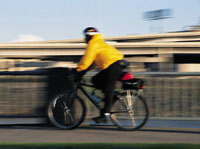 Boston’s popular Hubway bike sharing program will expand into Cambridge and Somerville next spring, providing more opportunities for healthy, environmentally-friendly and fun travel.
Boston’s popular Hubway bike sharing program will expand into Cambridge and Somerville next spring, providing more opportunities for healthy, environmentally-friendly and fun travel.
Boston’s program, which began in July 2011, is scheduled to close its 60 bike rental stations and 600 bikes this week for the winter. Bikes are expected to be available again next March, weather permitting. At the same time, Cambridge plans to open 20 stations in areas such as Harvard, Central and Inman squares. Somerville plans to open 8 stations including in Porter, Union and Davis squares.
Brookline is also working on adding two Hubway stations at Coolidge Corner and Brookline Village.
Boston’s Hubway program had 3,650 annual members in its first season. The system is partly funded by a $3 million grant from the Federal Transit Administration. It is intended for short trips as an extension of public transit. Annual members who pay $85 per year and those with one-day $5 and three-day $12 memberships can take unlimited rides, but they must return bikes within 30 minutes to avoid incurring additional fees.
Among annual members, the average ride lasted 17 minutes.
As officials close up the Boston program for the winter, they report concerns over an increase in bicycle accidents never materialized. The program saw no serious bike crashes requiring ambulance response and only two bike accidents overall.
But one issue is less than half of Hubway cyclists appeared to wear bike helmets, the program reported. Nearly 75 percent of riders on other bikes wore helmets. The city of Boston has tried to boost bike helmet use by working with 30 bike shops to offer subsidized bike helmets for less than $10.
The Boston bike accident lawyers at Breakstone, White & Gluck urge cyclists to learn Massachusetts bicycle laws. Click here for our guide.
We also urge cyclists to consider purchasing bicycle accident injury protection through their automobile insurance policies. Check your uninsured and underinsured motorist coverage, which provides protection if there is a bicycle accident. This insurance is affordable and can ease the physical and financial recovery after a bicycle accident. Click to read our guide What Every Bicyclist Needs to Know About Car Insurance.
Click here to read an article in The Boston Globe about the Hubway bicycle sharing program.
Click here to learn more about Boston’s Hubway sharing program.
Read More

